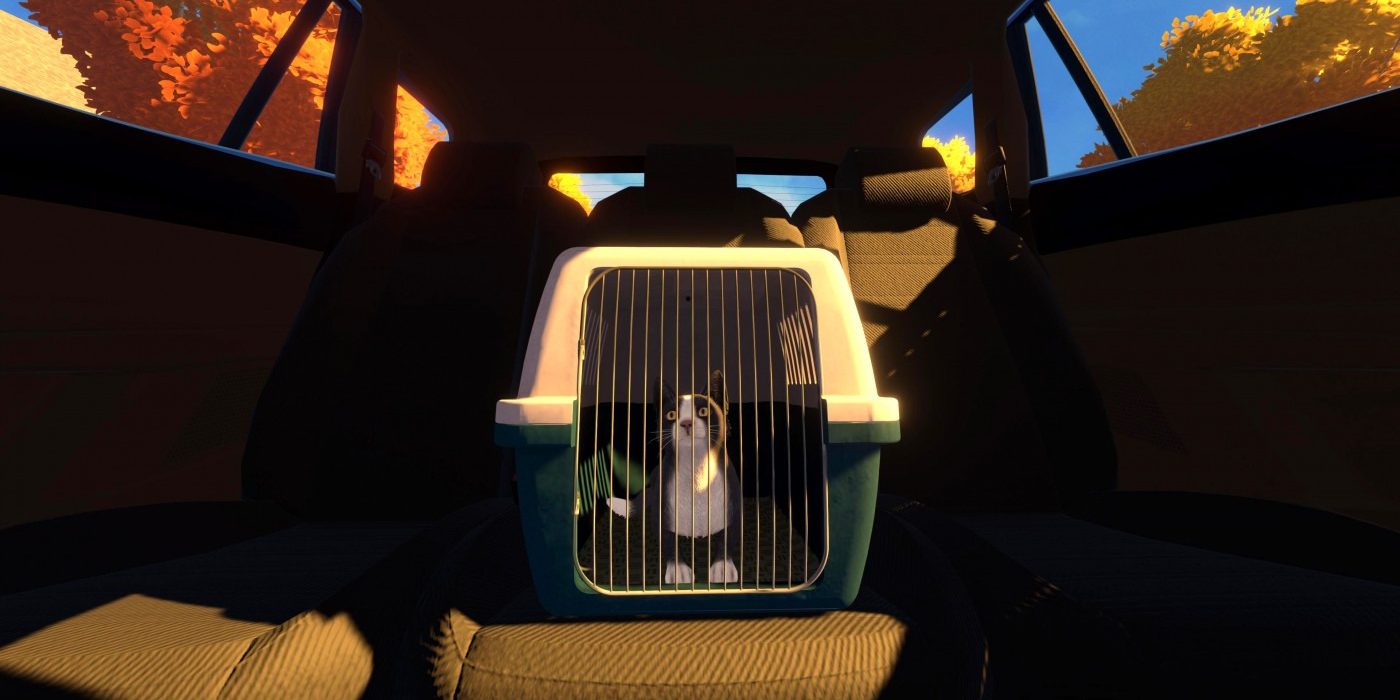Copycat: a ‘tail’ of mixed messages
Earlier last year, Spoonful of Wonder dropped its debut game, Copycat. The game is narrative-driven and played from the perspective of a cat, reminiscent of Stray. As the player, you know little about your backstory. You start your journey by getting adopted from a shelter by an old lady called Olive, as her original cat Dawn went missing. Through some clever story, you can figure out that your past wasn’t exactly the best, causing you to be defensive and untrusting towards humans. One of the first choices that you take is how to lash out at Olive, whether to scratch or bite.
However, while I think the story starts off as something emotional and clearly heading towards a moral lesson, it falls flat with over-simplistic game mechanisms and underdeveloped plot points.
The story seems to start off as a tale of trust and bond between a wounded shelter cat and a sickly old lady
After you get brought home, the game turns into a bit of fun mischief as you try to settle into a new place and grapple with the concept that humans can be kind and loving. As you run around the house, you get to learn more about Olive, such as her hobbies, past and declining health. It, in turn, makes you feel awful when the game forces you to be a little menace, in true cat fashion, by knocking things over and making a mess.
Already the controls present themselves as limited with the typical WASD to move, SPACE to jump and occasional use of Q and E to interact with items. The ability to jump was perhaps not the best move as it wasn’t necessary for the gameplay and didn’t work too well, often causing you to fly past what you wanted to land on.
When you are at home, you meet the narrator, a sort of omniscient national geographic-esque voice that is very reminiscent of The Stanley Parable’s narrator. This narrator presents himself in different situations, often when there is something to process or when it is time to grow (emotionally). This is because the narrator tries to teach you how to be a ‘proper cat’ but also appears after moments of distress, such as when paramedics arrive to administer emergency help for Olive. He is also the one who ends up delivering the moral message of home being a place where you are needed.
This action was wildly out of character
The story seems to start off as a tale of trust and bond between a wounded shelter cat and a sickly old lady. She is even presented as very kind and patient, ignoring any lashing out as it’s just a symptom of the cat’s past. Eventually, her daughter throws the cat, admitting to getting rid of the first Dawn in an attempt to get her mother into a care home. In the time that you are gone, the original Dawn returns and takes your spot in the house.
This is when the story goes a bit off script. Olive, the cat lover, refuses to take you back in because there is already a cat in her house. This is the same even after she realises her mistake, that both the real Dawn and adopted Dawn want to live with her. Her solution? Take the adopted cat that she vowed to shelter and drive her into the middle of nowhere. This abandonment took away from any emotion I felt towards Olive. This action was wildly out of character and was then swiftly forgiven by the cat as she adopted both of them once in the care home.
I do not find myself so forgiving, and that subpar writing ruined the emotional experience. Sure, it served as a way to show that the cat couldn’t make it out in the streets, but I feel there could’ve been other ways to do this, or at least some nods to Olive not being the perfect cat lover. There were also other random plot points that didn’t add up, such as Olive forgiving her daughter for almost smothering her with a pillow in her sleep! I understand that the writers had limited time to show their imperfect relationship and the struggles of an elderly person wanting to feel seen and the carer wanting them to be safe but surely there could’ve been a less drastic option.
Overall, I think the game made a decent attempt at a moral lesson and raising awareness, but its storytelling fell flat. I also think that it might have benefited from being a short film instead of a video game, as the controls were just a bit too simple and repetitive. Losing was also impossible and it’s not like you had any true control with different choices leading to different outcomes.

Comments